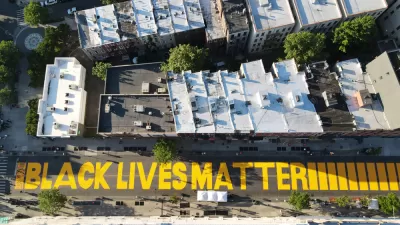At the CNU-FL statewide meeting held last week, Andrés Duany articulated his vision for how planning must adapt to the new realities of "national impoverishment" and climate change by utilizing the tools of tactical urbanism, writes Erin Chantry.
Acknowledging that two key issues that have emerged in the last five years - pervasive impoverishment from the Great Recession and the "psychological shifts of impending climate change" - have called into question the principles of New Urbanism that he had helped codify, Duany elucidated the tools that will be necessary for the changing practice of planning and urban design.
"Lean. Guerilla. Incremental. Vernacular. Tactical."
"On the other side of the economic downturn, or at least a good way through it," says Chantry, "Duany learned that the future of New Urbanism was in the ability for the organization and it’s professionals to be adaptable, incremental, and minimal. In other words, Duany said 'an urbanist does the least necessary and lets everyone else naturally do the rest.'”
He pointed to the transformation of the Wynwood Arts District in Miami as a prime example of the type of long-term change through small and short-term actions that's at the heart of the tactical urbanist movement. "The neighborhood’s ability to redevelop through adaption with small incremental change is an example of how our industry must shift to address the changing priorities of the future planning profession," notes Chantry.
As an avowed, but conflicted, New Urbanist, she, for one, is pleased with the tactical shift. "[B]y Duany proclaiming that his 'heavy, armored brigade' idea of urbanism (i.e., the rules, guides, and strict formulas) has become irrelevant, he has immediately made New Urbanism more relevant to my beliefs as an urbanist."
FULL STORY: The New, New Urbanism

Alabama: Trump Terminates Settlements for Black Communities Harmed By Raw Sewage
Trump deemed the landmark civil rights agreement “illegal DEI and environmental justice policy.”

Study: Maui’s Plan to Convert Vacation Rentals to Long-Term Housing Could Cause Nearly $1 Billion Economic Loss
The plan would reduce visitor accommodation by 25% resulting in 1,900 jobs lost.

Planetizen Federal Action Tracker
A weekly monitor of how Trump’s orders and actions are impacting planners and planning in America.

Wind Energy on the Rise Despite Federal Policy Reversal
The Trump administration is revoking federal support for renewable energy, but demand for new projects continues unabated.

Passengers Flock to Caltrain After Electrification
The new electric trains are running faster and more reliably, leading to strong ridership growth on the Bay Area rail system.

Texas Churches Rally Behind ‘Yes in God’s Back Yard’ Legislation
Religious leaders want the state to reduce zoning regulations to streamline leasing church-owned land to housing developers.
Urban Design for Planners 1: Software Tools
This six-course series explores essential urban design concepts using open source software and equips planners with the tools they need to participate fully in the urban design process.
Planning for Universal Design
Learn the tools for implementing Universal Design in planning regulations.
Caltrans
Smith Gee Studio
Institute for Housing and Urban Development Studies (IHS)
City of Grandview
Harvard GSD Executive Education
Toledo-Lucas County Plan Commissions
Salt Lake City
NYU Wagner Graduate School of Public Service




























